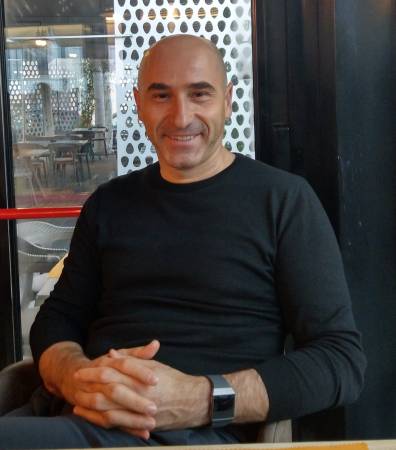Carnegie Mellon University
Resource-constrained learning and inference for visual perception
Zoom Link Abstract Real-world applications usually require computer vision algorithms to meet certain resource constraints. In this talk, I will present evaluation methods and principled solutions for both cases of training and testing. First, I will talk about a formal setting for studying training under the non-asymptotic, resource-constrained regime, i.e., budgeted training. We analyze the [...]
Carnegie Mellon University
Multi-hypothesis iSAM2 for Ambiguity-aware Passive and Active SLAM
Archived video Abstract Simultaneous localization and mapping (SLAM) is the problem of estimating the state of a moving agent with sensors on it while simultaneously reconstructing a map of its surrounding environment, which has been a popular research field due to its wide applications. As many state-of-the-art SLAM algorithms can already achieve high accuracy in [...]
Learning to See Through Occlusions and Obstructions
Virtual VASC: https://cmu.zoom.us/j/249106600 Abstract: Photography allows us to capture and share memorable moments of our lives. However, 2D images appear flat due to the lack of depth perception and may suffer from poor imaging conditions such as taking photos through reflecting or occluding elements. In this talk, I will present our recent efforts to [...]
Carnegie Mellon University
Terrain Relative Navigation for Lunar Polar Roving: Exploiting Geometry, Shadows, and Planning
Archived Zoom Video Abstract Water ice at the lunar poles could be the most valuable resource beyond planet Earth. However, that value is not foregone, and can only be determined by rovers that evaluate the distributions of abundance, concentration, and characteristics of this ice. The near-term explorations will be solar and unlikely to endure night, [...]
Carnegie Mellon University
Resource-Constrained State Estimation with Multi-Modal Sensing
Zoom Link Accurate and reliable state estimation is essential for safe mobile robot operation in real-world environments because ego-motion estimates are required by many critical autonomy functions such as control, planning, and mapping. Computing accurate state estimates depends on the physical characteristics of the environment, the selection of suitable sensors to capture that information, and [...]
Detectron2 in Object Detection Research
Virtual VASC: https://cmu.zoom.us/j/249106600 Abstract: Detectron2 is Facebook's library for object detection and segmentation. It has been used widely in FAIR's research and Facebook's products. This talk will introduce detectron2 with a focus on its use in object detection research, including the lessons we learned from building it, as well as the new research enabled [...]
Carnegie Mellon University
Aditya Dhawale – MSR Thesis Talk
Title: Hierarchical Gaussian Distributions for Real-Time SLAM ZOOM Link: (Virtual Presentation) https://cmu.zoom.us/j/7210519673 Abstract: We present Gaussian distributions as structure primitives in a hierarchical multi-fidelity framework to enable accurate real-time Simultaneous Localization and Mapping (SLAM) using uncertain depth data. Real-time mapping and localization capabilities on a mobile robot can enable deployment of robots in real-world scenarios. An autonomous system must [...]
Fairness in visual recognition
Virtual VASC Seminar: https://cmu.zoom.us/j/249106600 Abstract: Computer vision models trained on unparalleled amounts of data hold promise for making impartial, well-informed decisions in a variety of applications. However, more and more historical societal biases are making their way into these seemingly innocuous systems. Visual recognition models have exhibited bias by inappropriately correlating age, gender, sexual [...]
Carnegie Mellon University
Planning and Execution using Inaccurate Models with Provable Guarantees
Zoom Link Abstract: Models used in modern planning problems to simulate outcomes of real world action executions are becoming increasingly complex, ranging from simulators that do physics-based reasoning to precomputed analytical motion primitives. However, robots operating in the real world often face situations not modeled by these models before execution. This imperfect modeling can lead [...]
Carnegie Mellon University
Hybrid Soft Sensing in Robotic Systems
Zoom Link Abstract: The desire to operate robots in unstructured environments, side-by-side with humans, has created a demand for safe and robust sensing skins. Largely inspired by human skin, the ultimate goal of electronic skins is to measure diverse sensory information, conform to surfaces, and avoid interfering with the natural mechanics of the host or [...]
Carnegie Mellon University
The Effect of Locomotion Configuration on Discrete Obstacle Traversal for a Small Tracked Vehicle
Zoom Link Abstract: As mobile robots are being designed for increasingly rugged and unknown terrain, mechanical reconfigurability presents one possibility for improving vehicle efficiency and mobility. To validate this idea, we created an 18.5-kg modular tracked vehicle with adjustable track tension, track width, track length, and sprocket diameter. In this talk, I will explain the [...]
Carnegie Mellon University
Qian Long – MSR Thesis Talk
ZOOM Link: https://cmu.zoom.us/j/7263914910 Title: Evolutionary Population Curriculum for Scaling Multi-Agent Reinforcement Learning Abstract: In multi-agent games, the complexity of the environment can grow exponentially as the number of agents increases, so it is particularly challenging to learn good policies when the agent population is large. We introduce Evolutionary Population Curriculum (EPC), a curriculum learning [...]
Wen-Hsuan Chu – MSR Thesis Talk
ZOOM Link: https://cmu.zoom.us/j/4417558334 Title: Neural Batch Sampling with Reinforcement Learning for Semi-Supervised Anomaly Detection Abstract: We are interested in the detection and segmentation of anomalies in images where the anomalies are typically small (i.e., a small tear in woven fabric, bro-ken pin of an IC chip). From a statistical learning point of view, anomalies have [...]
Carnegie Mellon University
Chendi Lin – MSR Thesis Talk
Zoom Link: https://cmu.zoom.us/j/95571441174 Title: Online Connectivity-aware Dynamic Distribution for Heterogeneous Multi-Robot Systems Abstract: In many multi-robot applications the robot team needs to execute multiple tasks simultaneously with different task-related controllers. To ensure effective coordination and at the same time avoid collisions, the robots have to stay connected. In this work, we consider the problem where a [...]
Carnegie Mellon University
Robert Li – MSR Thesis Talk
Zoom Link: https://cmu.zoom.us/j/91465601940 Title: Solving Puzzles Like A Human With Two Stage Random Search Abstract: Humans are remarkably good at solving novel physical puzzles and tasks, with only a basic understanding of abstract concepts like kinematics, gravity, mass, friction, and inertia. We wanted to replicate how a human would explore the search space of a problem. [...]
Samantha Speer – MSR Thesis Talk
Zoom Link: https://cmu.zoom.us/j/98546775449 Title: Grounding Abstract Concepts With Robotic Manipulatives Abstract: Technology in education has been on the rise for a long time, developing from computer manipulatives to mobile apps and finally into robotics. Robotics has the unique affordances of the classic physical manipulatives and virtual manipulative, providing both a physical aspect along with [...]
Carnegie Mellon University
Vaibhav (Vai) Viswanathan – MSR Thesis Talk
Zoom Link: https://cmu.zoom.us/j/2112607862 Title: Bitwise Trajectory Elimination: An Efficient Method for Filtering Trajectory Libraries for Quadrotor Navigation Abstract: Quadrotor flight in unknown environments is challenging due to the limited range of perception sensors, state estimation drift, and limited onboard computation. In this work, we tackle these challenges by proposing an efficient, reactive planning approach. We introduce [...]
Carnegie Mellon University
Xi (Sandy) Sun – MSR Thesis Talk
Zoom link: https://cmu.zoom.us/j/94541819048 Title: Visual-Inertial Source Localization for Co-Robot Rendezvous Abstract: We aim to enable robots to visually localize a target person through the aid of an additional sensing modality -- the target person's 3D inertial measurements. The need for such technology may arise when a robot is to meet a person in [...]
Carnegie Mellon University
Harsh Agarwal – MSR Thesis Talk
Zoom Link: https://cmu.zoom.us/j/99544484313 Title DeepBLE - Generalizing RSSI based Localization Across Different Devices Abstract Accurate smartphone localization ( < 1-meter error) for indoor navigation using only RSSI received from a set of BLE beacons remains a challenging problem, due to the inherent noise of RSSI measurements. To overcome the large variance in [...]
Carnegie Mellon University
Xia Chen – MSR Thesis Talks
ZOOM Link: https://cmu.zoom.us/j/93785335144 Title: Combining Semantic and Geometric Understanding for Modern Visual Recognition Tasks Abstract: For autonomous driving perception, visual data, such as camera image and LiDAR point cloud, consists of two aspects: semantic feature and geometric structure. While usually studied separately, these two properties can be combined and jointly used by a unified framework. [...]
Carnegie Mellon University
Himanshi Yadav – MSR Thesis Talk
Zoom Link: https://cmu.zoom.us/j/96397153508 Title: A Comprehensive Study of Unsupervised Classification Techniques for Hyperspectral Datasets Abstract: Unsupervised learning and in this specific research, clustering regional composition in hyperspectral images, poses significant challenges in the fields of machine learning and remote sensing. Hyperspectral images capture the spectral information in many wavelengths, as opposed to typical images that [...]
Carnegie Mellon University
Alan Zhao – MSR Thesis Talk
Zoom Link: https://cmu.zoom.us/j/98144379626 Title Learning Precise and Task-oriented Grasps for Robotic Assembly Abstract Robust, precise, and task-oriented grasp planning is vital for autonomous robotic assembly. It requires reasoning about the object geometry and preconditions of a task so as to properly grasp an object and complete the down-stream tasks. However, achieving such [...]
Carnegie Mellon University
Task-Driven Modular Networks for Zero-Shot Compositional Learning
Zoom Link Abstract: One of the hallmarks of human intelligence is the ability to compose learned knowledge into novel concepts which can be recognized without a single training example. In contrast, current state-of-the-art methods require hundreds of training examples for each possible category to build reliable and accurate classifiers. To alleviate this striking difference in [...]
Bio-inspired depth sensing using computational optics
Virtual Seminar: https://cmu.zoom.us/j/249106600 Abstract: Jumping spiders rely on accurate depth perception for predation and navigation. They accomplish depth perception, despite their tiny brains, by using specialized optics. Each principal eye includes a multitiered retina that simultaneously receives multiple images with different amounts of defocus, and distance is decoded from these images with seemingly little [...]
Carnegie Mellon University
Active Vision: Autonomous Aerial Cinematography with Learned Artistic Decision-Making
Zoom Link Abstract: Aerial cinematography is revolutionizing industries that require live and dynamic camera viewpoints such as entertainment, sports, and security. Fundamentally, it is a tool with immense potential to improve human creativity, expressiveness, and sharing of experiences. However, safely piloting a drone while filming a moving target in the presence of obstacles is immensely [...]
Carnegie Mellon University
Efficient Robot Decision-Making for Achieving Multiple Independent Tasks
Zoom Link Abstract: We focus on robotics applications where a robot is required to accomplish a set of tasks that are partially observable and evolve independently of each other according to their dynamics. One such domain that we target in this work is decision-making for a robot waiter waiting tables at a restaurant. The robot [...]
Image to LiDAR Map Registration using Late Feature Projection
Zoom Link Abstract: Accurate localization is essential for autonomous operation in many problem domains. This is most often performed by comparing LiDAR scans collected in real-time to a HD point cloud based map. While this enables centimeter-level accuracy, it depends on an expensive LiDAR sensor at run time. Recently, efforts have been underway to reduce [...]
Carnegie Mellon University
Vision with Small Baselines
Zoom Link Abstract: 3D sensing with portable imaging systems is becoming more and more popular in computer vision applications such as autonomous driving, virtual reality, robotics manipulation and surveillance, due to the decreasing expense and size of RGB cameras. Despite the compactness and portability of the small baseline vision systems, it is well-known that the [...]
Carnegie Mellon University
Provably Constant-time Motion Planning
Zoom Link Abstract: In manufacturing and warehouse scenarios, robots often perform recurring manipulation tasks in structured environments. Fast and reliable motion planning is one of the key elements that ensure efficient operations in such environments. A very common example scenario is of manipulators working at conveyor belts, where they have limited time to pick moving [...]
Carnegie Mellon University
Humans In Their Natural Habitat: Training AI to Understand People
Zoom Link Abstract: Computer vision has a great potential to help our daily lives by searching for lost keys, watering flowers or reminding us to take a pill. To succeed with such tasks, computer vision methods need to be trained from real and diverse examples of our daily dynamic scenes. First, we need to give [...]
Task-specific Vision DNN Models and Their Relation for Explaining Different Areas of the Visual Cortex
Virtual VASC Seminar: https://cmu.zoom.us/j/249106600 Abstract: Deep Neural Networks (DNNs) are state-of-the-art models for many vision tasks. We propose an approach to assess the relationship between visual tasks and their task-specific models. Our method uses Representation Similarity Analysis (RSA), which is commonly used to find a correlation between neuronal responses from brain data and models. [...]
Carnegie Mellon University
A Theory of Fermat Paths for Non-line-of-sight Shape Reconstruction
Zoom Link Abstract: Traditionally, computer vision systems and algorithms, such as stereo vision, and shape from shading, have been developed to mimic human vision. As a consequence, a lot of these systems operate under constraints that we take for granted in human vision. An example of such a constraint is that the scene of interest [...]
Learning Contextual Actions for Heuristic Search-Based Motion Planning
Zoom Link Abstract: Heuristic search-based motion planning can be computationally costly in large state and action spaces. In this work we explore the use of generative models to learn contextual actions for successor generation in heuristic search. We focus on cases where the robot operates in similar environments, i.e. environments drawn from some underlying distribution. [...]
End-to-end Generative 3D Human Shape and Pose Models and Active Human Sensing
Virtual VASC Seminar: https://cmu.zoom.us/j/249106600 Title: End-to-end Generative 3D Human Shape and Pose Models and Active Human Sensing Abstract: I will review some of our recent work in 3d human modeling, synthesis, and active vision. I will present our new, end-to-end trainable nonlinear statistical 3d human shape and pose models of different resolutions (GHUM and GHUMLite) as [...]






























